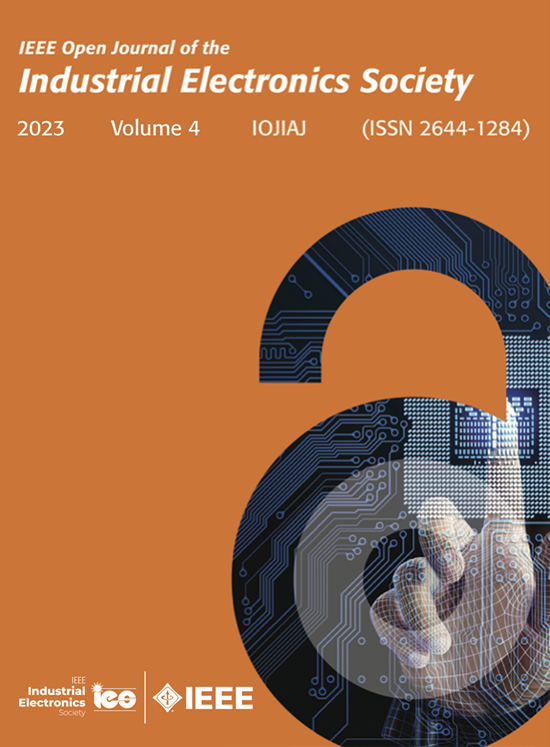On the Inadequacy of IEC 60034-2-3 and IEC 60034-30-2 Standards for Power Losses, Efficiency and Energy Class Evaluation in PWM Multilevel Inverter-Driven PMSM
IF 4.3
Q1 ENGINEERING, ELECTRICAL & ELECTRONIC
IEEE Open Journal of the Industrial Electronics Society
Pub Date : 2025-03-29
DOI:10.1109/OJIES.2025.3574857
引用次数: 0
Abstract
This work aims to highlight the inadequacy of international standards IEC 60034-2-3 and IEC 60034-30-2 for accurate efficiency, power losses, and efficiency class determination of ac motors fed by multilevel inverters driven with multicarrier pulsewidth modulation (PWM) strategies. The main motivation of this work stems from the fact that international standards IEC 60034-2-3 and IEC 60034-30-2 prescribe the use of the two-level voltage source inverter for ac motor losses, efficiency, and efficiency class determination, even for multilevel-inverter-fed ac motor. Therefore, this analysis aims to experimentally demonstrate IEC standards inadequacy, emphasizing the need to update them and provide a comprehensive framework for developing a power measurement procedure, specifically tailored to multilevel inverter-fed ac drives. More specifically, the goal is to support standardization bodies by simplifying their task and enabling IEC standards generalization to almost every multicarrier PWM-controlled multilevel inverter-fed ac drive. To this end, an accurate power loss analysis of an interior permanent magnet synchronous motor fed by a five-level cascaded H-bridge inverter, controlled with several multicarrier PWMs, is carried out. In detail, a precise power analysis in the frequency domain is performed to evaluate the impact of modulation strategies on motor power losses at different operating points in the speed–torque plane in terms of power losses, fundamental, and harmonic power losses. The motor power losses obtained with a five-level cascaded H-bridge multilevel inverter are compared to those obtained with a conventional two-level voltage source inverter, demonstrating that the application of IEC 60034-2-3 and IEC 60034-30-2 provides an underestimated motor energy efficiency class (IE-code).关于iec60034 -2-3和iec60034 -30-2在PWM多电平逆变器驱动的PMSM中功率损耗、效率和能量等级评估标准的不足
这项工作旨在强调国际标准IEC 60034-2-3和IEC 60034-30-2在多载波脉宽调制(PWM)策略驱动的多电平逆变器馈电交流电机的精确效率、功率损耗和效率等级确定方面的不足。这项工作的主要动机源于国际标准IEC 60034-2-3和IEC 60034-30-2规定使用两电平电压源逆变器进行交流电机损耗,效率和效率等级测定,甚至适用于多电平逆变器馈电交流电机。因此,本分析旨在通过实验证明IEC标准的不足,强调需要对其进行更新,并为开发专门针对多电平逆变电源交流驱动器的功率测量程序提供全面的框架。更具体地说,目标是通过简化标准化机构的任务,并使IEC标准能够推广到几乎所有多载波pwm控制的多电平逆变器馈电交流驱动器,从而支持标准化机构。为此,对由多载波pwm控制的五电平级联h桥逆变器馈电的内部永磁同步电机进行了精确的功率损耗分析。详细地说,在频域进行了精确的功率分析,以评估调制策略对电机功率损耗的影响在不同的工作点在速度-转矩平面上的功率损耗,基波功率损耗和谐波功率损耗。将五电平级联h桥多电平逆变器获得的电机功率损耗与传统的两电平电压源逆变器获得的电机功率损耗进行了比较,表明IEC 60034-2-3和IEC 60034-30-2的应用提供了一个被低估的电机能效等级(ie代码)。
本文章由计算机程序翻译,如有差异,请以英文原文为准。
求助全文
约1分钟内获得全文
求助全文
来源期刊

IEEE Open Journal of the Industrial Electronics Society
ENGINEERING, ELECTRICAL & ELECTRONIC-
CiteScore
10.80
自引率
2.40%
发文量
33
审稿时长
12 weeks
期刊介绍:
The IEEE Open Journal of the Industrial Electronics Society is dedicated to advancing information-intensive, knowledge-based automation, and digitalization, aiming to enhance various industrial and infrastructural ecosystems including energy, mobility, health, and home/building infrastructure. Encompassing a range of techniques leveraging data and information acquisition, analysis, manipulation, and distribution, the journal strives to achieve greater flexibility, efficiency, effectiveness, reliability, and security within digitalized and networked environments.
Our scope provides a platform for discourse and dissemination of the latest developments in numerous research and innovation areas. These include electrical components and systems, smart grids, industrial cyber-physical systems, motion control, robotics and mechatronics, sensors and actuators, factory and building communication and automation, industrial digitalization, flexible and reconfigurable manufacturing, assistant systems, industrial applications of artificial intelligence and data science, as well as the implementation of machine learning, artificial neural networks, and fuzzy logic. Additionally, we explore human factors in digitalized and networked ecosystems. Join us in exploring and shaping the future of industrial electronics and digitalization.
 求助内容:
求助内容: 应助结果提醒方式:
应助结果提醒方式:


